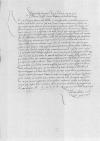Cum esse nobis renuntiatum, quae pro 1540-02-29⌊Dominica Oculi1540-02-29⌋
haberi in ⌊terris istis nostris Prussiae⌋ ⌊comitia⌋ volebamus, ea habita non esse tresque tantum istarum terrarum Prussiae consiliarios comitia illa obivisse. Eorum fidem ac studium in ⌊rempublicam⌋ commendand(um) duximus, alios vero non affuisse aequo animo ferre non possumus, cum nulla fuerit iusta causa, quamobrem ad comitia ista venire non potuerunt.
Nam quod privatis ad quemque litteris nostris ⌊comitia⌋ ista non ediximus, id eo factum a nobis est, quod supervacaneum esse putabamus, cum teneremus memoria, quo tempore fuerunt per nos ad 1540-05-08⌊diem divi Stanislai1540-05-08⌋ comitia edicta praeterito autumno eaque obita per consiliarios non essent propter pestis metum, datam a nobis fuisse facultatem terrarum istarum primis consiliariis comitia ista aliud in tempus magis commodum reiciendi. A quibus cum ea essent ad 1540-02-29⌊Dominicam Oculi1540-02-29⌋ ⌊Elbingi⌋ constituta, nos eorum sententia subscripsimus probarique nobis litteris nostris declaravimus ac nuntium nostrum ad ⌊comitia⌋ designavimus, ut quo minus habita sint comitia propter consiliariorum defectum, id eorum ipsorum, qui afuerint, culpa acciderit. Nunc Paternitatem Tuam hortamur, ut ea, quae tam publice, quam privatim non habitis ⌊comitiis⌋ neglecta sunt, sarciri curet. Quam ad rem ⌊comitia⌋ edicenda duximus ita, ut praesentibus litteris nostris edicimus, in ⌊civitate nostra Mariemburgensi⌋ ad 1540-05-08⌊diem divo Stanislao sacrum mense Maio proxime futuro1540-05-08⌋. Ad quae ⌊comitia⌋ hortamur Paternitatem Tuam, ut venire ne negligat auditaque legatione, quam nuntius noster nomine nostro exponet, una cum aliis de negotiis impendentibus ea, quae fuerint opportuna et necessaria, constituat factura pro debito suo proque gratia nostra.


 BNW, BOZ 953, f. 182v.
BNW, BOZ 953, f. 182v.